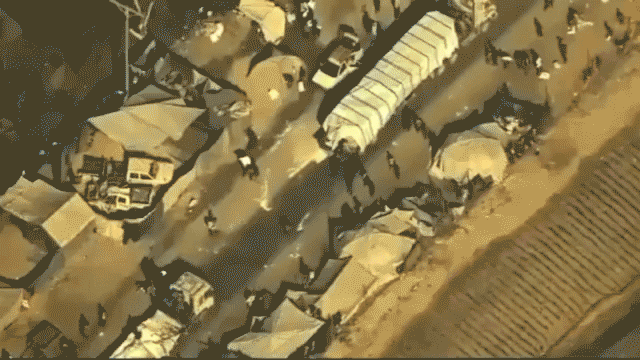Humanitarian Crisis in Gaza: Hamas Looting Aid Amid Ceasefire Efforts
In a deeply concerning development, surveillance footage captured by a U.S. military drone has revealed suspected Hamas operatives attacking an aid truck driver and stealing vital humanitarian supplies meant for civilians in Gaza. This incident, which took place on Friday and was released by U.S. Central Command (CENTCOM), has drawn sharp criticism from Secretary of State Marco Rubio, who condemned Hamas for “depriving the people of Gaza of the humanitarian aid they desperately need.” The footage shows armed individuals stopping the truck, assaulting the driver and leaving him on the road’s median before fleeing with both the vehicle and its crucial cargo. This troubling event highlights the ongoing challenges in delivering essential aid to civilians caught in the crossfire of the prolonged conflict, even during what should be a period of ceasefire.
The stolen truck was part of a larger humanitarian convoy carrying supplies from international partners to Gazans in northern Khan Younis. Monitored by the Civil-Military Coordination Center (CMCC) using an MQ-9 drone that was specifically tracking ceasefire implementation, the incident represents a significant setback to relief efforts. Secretary Rubio emphasized that this theft “undermines international efforts in support of President Trump’s 20 Point Plan to deliver critical assistance to innocent civilians.” He directly pointed to Hamas as “the impediment” to humanitarian relief, calling on the group to “lay down their arms and stop their looting so that Gaza can have a brighter future.” The fate of the driver remains unknown, adding a human dimension to this already disturbing situation.
The incident occurs at a critical juncture when international aid efforts have been ramping up significantly. According to CENTCOM, nearly 40 nations and international organizations are coordinating humanitarian, logistical, and security assistance for Gaza through the CMCC. Over the past week alone, “more than 600 trucks of commercial goods and aid” have been delivered into Gaza daily—an impressive logistical achievement now undermined by continued security threats. The CMCC, which officially opened on October 17 in southern Israel just days after the ceasefire took effect, serves as the central hub for Gaza stabilization efforts. With its operations floor designed to track real-time developments inside Gaza, the center represents a significant investment in coordinating the massive international response to the humanitarian crisis.
This recent theft isn’t an isolated incident but rather part of a troubling pattern. Data published in August by the United Nations Office for Project Services (UNOPS) revealed that most of its aid entering Gaza had been looted inside the Palestinian territory. This systemic problem of aid diversion has serious implications not only for the immediate welfare of Gazan civilians but also for the sustainability of international support. When donors see their contributions repeatedly stolen or misappropriated, it becomes increasingly difficult to justify continued assistance, potentially creating a vicious cycle where diminished aid leads to worsened humanitarian conditions. The international community faces the difficult challenge of ensuring aid reaches its intended recipients without being diverted for other purposes or stolen outright.
The broader context of this incident involves significant diplomatic pressure. President Trump has reportedly given Hamas a 48-hour ultimatum to return all deceased Gaza hostages, warning that “other countries will take action” if this demand isn’t met. Meanwhile, Israeli Prime Minister Netanyahu has ordered “immediate and powerful strikes in the Gaza Strip,” suggesting that the tenuous ceasefire may be at risk of collapse. These developments come at a time when a new study has highlighted how aid theft by terror groups and regimes is prolonging global conflicts—a finding that seems particularly relevant to the situation in Gaza. The humanitarian crisis is thus inseparable from the broader political and military dynamics at play in the region.
As international efforts continue to address the dire humanitarian situation in Gaza, this incident serves as a stark reminder of the complex challenges involved in delivering aid in conflict zones. Beyond the logistical hurdles of transporting supplies into a war-ravaged area, there are significant security concerns that threaten both the aid itself and those tasked with delivering it. The human cost is immeasurable—from the unknown fate of the attacked driver to the countless Gazan civilians who will go without essential supplies due to this theft. Moving forward, the international community will need to continue balancing the urgent humanitarian imperative to help those in need with the practical reality of operating in an environment where armed groups may target aid convoys. The establishment of the CMCC represents an important step toward coordinated action, but as this incident demonstrates, much work remains to be done to ensure aid safely reaches those who need it most.













